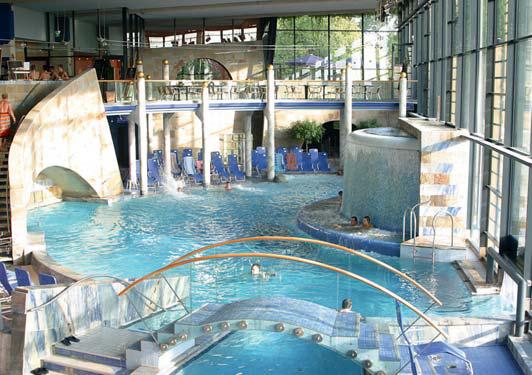A spa requires high drinking water quality and effective limescale protection
The Claudius Therme spa and wellness center in Cologne produces around 150 m3 of drinking water every day from its thermal well - a well that delivers around 17 m3 of thermal water per hour around the clock from a depth of around 500 m. With a water hardness of around 30 °dH, an effective limescale protection solution was and is needed - an urgent need that has been solved with a BICOAT system, which flushes out the limescale in the water through a crystallization process. It has proven to be a highly effective lime protection solution, and in addition, both the operating costs and service effort for the system have been low from commissioning to the present day.
Even in a city of millions like Cologne, you don't have to travel far for a relaxing break from the hectic pace of everyday life.
The Claudius-Therme, built in 1996 in Cologne/Deutz on the right bank of the Rhine, is a sanctuary that attracts many wellness lovers from the city and the surrounding area. Guests entering the spa and wellness center immediately notice the contrast: outside is the pulsating, hectic city with its dense traffic - inside is peace, relaxation, comfort, and a range of wellness offers. But the entire idyll of the story depends on one thing: The quality of the drinking water!
Only the best drinking water quality is good enough
Mathias Hägeholz, Technical Manager of Claudius-Therme, says: "Drinking water of the highest quality is indispensable for trouble-free bathing, and lime protection is only one of many prerequisites. Among other things, we need to check the drinking water to ensure that the quality complies with the Drinking Water Ordinance - which means 100-150 m³/d for the sanitary facilities and wellness center administration".
"We started with a control of eight water analyses per year, now we are down to four. An independent laboratory takes the water samples and sends the results to the health authorities. We have systematically eliminated fatal points such as stagnation or critical temperatures in the pipework," says Mathias Hägeholz.
He continues: "Without the limescale protection system, we would have had to clean all surfaces much more often. And especially in the hot water area, limescale deposits would form in pipes, fittings, and especially in the heat exchangers - to the detriment of efficiency".

The addition of chemical substances would have reached unacceptable dimensions
In the early years, the spa operators still used drinking water from the city of Cologne. Over time, however, the costs became increasingly high. Later, a second well was drilled at a depth of 30 meters to obtain sufficient drinking water from their source. The pumping capacity proved to be unproblematic, but not the lime content: With almost 32 °dH, a technical solution for lime protection was urgently needed.
"Water treatment with chemical additives would have reached unacceptable dimensions," says Jörg Krause, a SPA and wellness specialist who was involved in the planning phase and then responsible for technical operations for several years.
A brave and right decision to choose BIOCAT
Jörg Krause sought an economically favorable solution to the limescale problem when the drinking water borehole was expanded. He decided in favor of BIOCAT limescale protection systems, even though he had never worked with them before.
"Back then, it took a lot of courage to make such a decision," says Krause. Innovative lime protection solutions with DVGW test marks were not yet widespread. But the success still proves him right today. "I was also able to justify the decision because the customer was dealing with planning and operation at the same time," explains Krause.
Demand for a robust and uncomplicated management technique
External planners are often reluctant to use innovative solutions for warranty reasons. For Krause, however, this was not a problem. The system planner placed particular emphasis on a robust and uncomplicated control technology to ensure trouble-free operation. The BIOCAT granulate has only had to be replaced once within the prescribed service intervals, and only recently did one of the three ball valves have to be replaced because a microswitch had been misaligned.
Need for a reliable solution with high-capacity
"In a spa with a daily opening time of around 16 hours, reliability is a high priority," says Jörg Krause. "That's why I favor simple technology."
"There is a significant difference in the drinking water system between a residential building, an administration building, and thermal baths. The hygienic requirements are the same, but the use of sanitary facilities is very different. A shower head in a thermal bath is exposed to an extremely high-water flow rate, which would perhaps only be reached in the bathroom of an apartment after about 80 years," says Jörg Krause.
"I decided on BIOCAT systems for the Claudius-Therme because I consider the physical behavior to be a reliable alternative. The water consumption we have here at the Claudius-Therme is quite rare in building installations. Lime protection in such dimensions can no longer be achieved sensibly and cost-effectively with chemical methods," concludes Jörg Krause.

The BIOCAT limescale protection system in the Claudius-Therme
All drinking water is first pumped from the well in the Claudius-Therme through the BIOCAT limescale protection system using frequency-controlled feed pumps. This is important so that the drinking water with its high lime content cannot cause deposits in the pipework. Otherwise, the limescale would mainly deposit on the boilers' plate heat exchangers and reduce their efficiency. In addition, taps and shower heads could not simply flush out the limescale. You could also fear deposits in the copper pipes. And not only there: Ceramics, mirrors, or other surfaces on which drinking water leaves traces would be much more difficult to clean.
